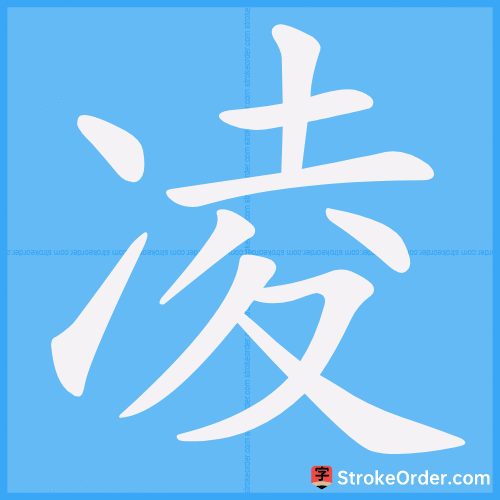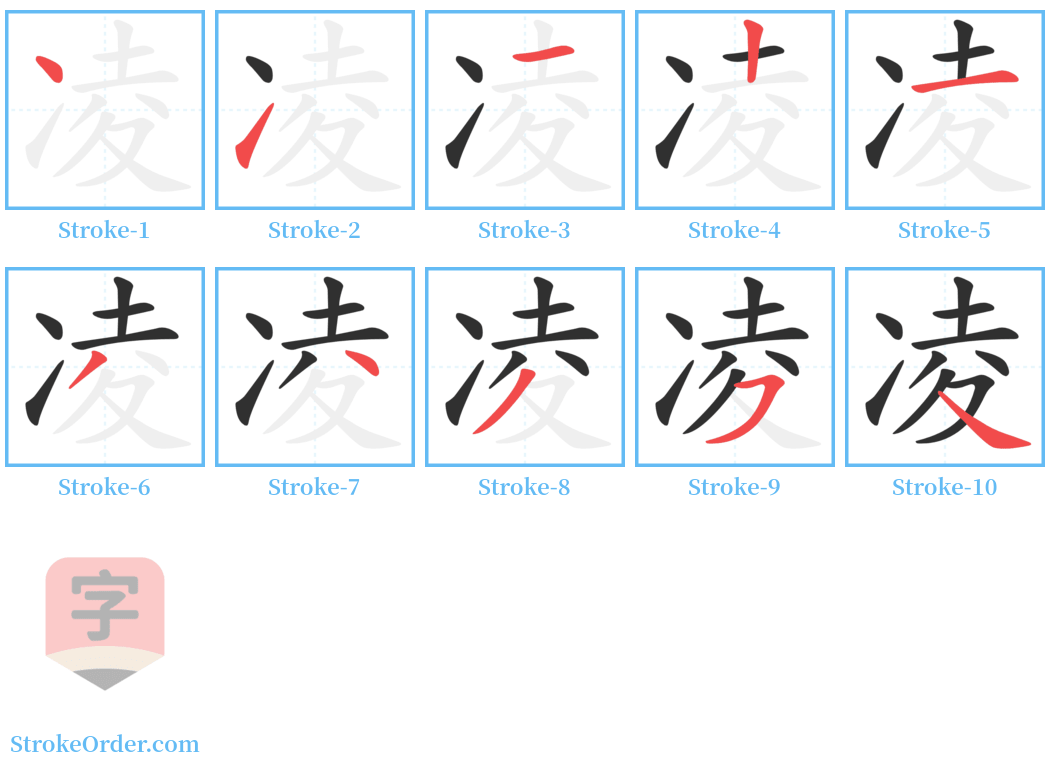凌 Stroke Order
Animated Stroke Order of 凌

Stroke Order Diagrams for 凌

Step-by-Step Handwriting Guide for 凌

Learn to Write Chinese Characters with Video Tutorials
Watch the video of writing the Chinese character "凌", learn the correct stroke order (笔顺) of the character "凌", and master the standard way of writing the character "凌".
Free Printable Handwriting Practice with Stroke Order: 凌
Printable Writing Practice Worksheet of "凌" in Portrait Orientation (Tian Zi Ge)

Printable Writing Practice Worksheet of "凌" in Landscape Orientation (Tian Zi Ge)

Information of 凌
Pinyin
líng
Radical
冫
Strokes
10 strokes
Usage
★★★★★
Definition
encroach / soar / thick ice
凌 [líng]
1. Ice: Ice ~. ~ Cone. Dripping water forms ~.
2. Encroachment, bullying: Bully ~. ~ Pressure. ~ Humiliation. ~ Insult. Relying on strength to ~ the weak.
3. Disorder, interwoven: ~ Confused. ~ Messy.
4. Ascend, rise above: ~ Clouds. ~ Skies. ~ Void. ~ Ride. "One should reach the ~ peak, to see all other mountains as small."
5. Cross over, pass: "Even if there are dangers from rivers and lakes, one can ~."
6. Approaching, pressing close: ~ Morning.
7. Surname.
凌 [líng] (noun)
• Original meaning: Ice
• Character structure: Phonetic-semantic compound, from 仌 (bīng, ice, 夌 líng) phonetic.
• 1. Same as original meaning (ice).
• Example: Meng Jiao's "Cold River Song": Crossing the river, do not cross the ice, success needs a friend.
• Example:凌 мороз (ice in flowing water); 凌灾 (disaster caused by ice blockage); 凌床 (ice bed); 凌室 (ancient ice storage).
• 2. Ice room, ice cellar (ice cell).
• Example: 凌阴 (ice room).
• 3. Surname.
凌 [líng] (verb)
• 1. To store up ice.
• Example: Zhang Heng's "Thoughts on Darkness": Fish cherish scales and store up ice, birds perch on trees and lose branches.
• 2. To dominate; override.
• Example: Song Dynasty—Shen Kuo: Does not carve in winter.
• Example: Qing Dynasty—Hou Fangyu: Surpasses the Huafang department.
• Example: To ~ fiercely (almost); ~ gravel (to surpass); ~ stride (to exceed).
• 3. Bully; encroach on; insult.
• Example: Qu Yuan's "National Mourning": In the end, a strong man cannot be ~.
• Example: To ~ oppression; ~ abuse; ~ insult; ~ neglect; ~ abuse; ~ oppress.
• 4. Used to mean infringe (invade).
• Example: Qu Yuan's "National Mourning": In the end, a strong man cannot be ~.
• Example: To ~ sacred; ~ infringe; ~ abuse; ~ trample; ~ injure; ~ clash.
• 5. To rise to a height (only on certain elevations).
• Example: "The Book of Lord Shang" states: Attack will ~ its city.
• Example: Du Fu's "Gazing at the Mountains": One should reach the ~ peak to see all other mountains as small.
• Example: To ~ void (rise to the sky); ~ soar (fly high).
• 6. To tremble.
• Example: "Han Shu" says: Tigers and leopards ~ suddenly.
• 7. To run.
• Example: To ~ flow (flowing ice); ~ sharp (march forward with momentum).
• 8. Approaching.
• Example: Du Fu's "On Journey from the Capital to Fengxian County": ~ past Lishan at dawn.
• Example: To ~ morning; ~ thin (pressing close); ~ rub (draw near).
• 9. To ride.
• Example: To ~ wind (ride the wind).
• 10. To cross; negotiate.
• Example: Ge Hong wrote: The golden boat cannot ~ the waves of Yan Hou.
凌 [líng] (adjective)
• 1. Cold.
• Example: ~ winter (cold winter); ~ eerie (cold); ~ tremor (cold area); ~ ~ (grim; daunting; cold).
• 2. Disorder.
• Example: Yuan Zhen's "Five String Song": The wind entering spring pines is ~.
• Example: ~ disorder (chaotic and without order).
Input Method for 凌
Pinyin
ling2
Wubi
ufwt
Cangjie
imgce
Zhengma
tdor
Four Corner
34147
Unicode
U+51cc
Same Pronunciation Characters